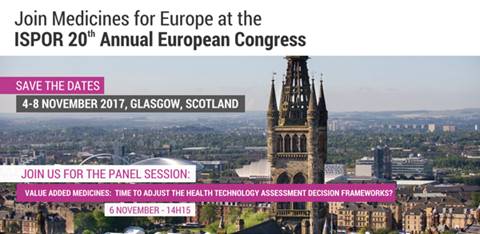
Medicines for Europe to join the ISPOR Issue Panel on value added medicines
Date
Sections
- The Issue Panel at the ISPOR European Congress in Glasgow on 6 November ‘Value Added Medicines: Time to Adjust the Health Technology Assessment Decision Frameworks?’ will debate how patients can benefit from value added medicines.
- Value added medicines are medicines which are based on 3 drug repurposing models: reformulation, repositioning or a combination of known molecules, which deliver substantial value for patients and society.
- HTA decision-making in Europe presents challenges for full value added recognition of these medicines. Addressing ways to recognise patient-centric innovation in value assessment frameworks is crucial for the assessment of value added medicines.
Value added medicines represent a major opportunity to improve patients’ quality of life, health outcomes or adherence, and to address a number of medicine-related healthcare inefficiencies, improving healthcare provision and organisation while contributing to the sustainability of healthcare systems.
To ensure access to value added medicines for patients, the Value Added Medicines Group, a sector group of Medicines for Europe, will participate in the ISPOR 20th Annual European Congress on an Issue Panel entitled “Value Added Medicines: Time To Adjust The Health Technology Assessment Decision Frameworks?”.
Moderated by Professor Michael Drummond (Professor of Health Economics at the Univerity of York), the panellists (Professor Mondher Toumi from the Public Health Department of Aix-Marseille University, Professor Ulf Persson from the Swedish Institute of Health Economics and Luigi Burgio – Head of Market Access Teva Italy and Chairman of the HTA Working Group at Medicines for Europe) will debate current challenges for capturing the benefits of value added medicines as well as key recommendations to integrate and recognise patient-centric innovation in HTA decision frameworks.
Umberto Comberiati, the Chairman of the Value Added Medicines Group,: “The time has come to explore new areas to deliver better health and access for patients, tapping into a sustainable source of patient-centric innovation. Value added medicines are an opportunity to deliver benefits to patients, payers and healthcare systems. However, there is a challenge to ensure that benefits can be appropriately assessed via HTA decision frameworks. The ISPOR Issue Panel will allow an informed debate among experts, industry and stakeholders.”
Medicines for Europe invites you to join the ISPOR European Congress in Glasgow and please follow us on Twitter and LinkedIn to know more about how European patients can better benefit from value added medicines. More information on the Issue Panel and the challenges and recommendations on adjusted HTA decision frameworks for value added medicines can be found here.
About the Value Added Medicines Group
The Value Added Medicines Group is a sector group of Medicines for Europe which aims to optimise, rethink and reinvent medicines based on known molecules and to bring untapped innovation to improve care delivery. The Value Added Medicines Group adopts a complementary perspective compared to the other Medicines for Europe sector groups: by tackling the targeted portion of patients’ needs that remain unmet to this day, delivering additional improvement to the healthcare community as a whole.
About Medicines for Europe
Medicines for Europe represents the generic, biosimilar and value added medicines industries across Europe. Its vision is to provide sustainable access to high quality medicines, based on 5 important pillars: patients, quality, value, sustainability and partnership. Its members employ 160,000 people at over 350 manufacturing and R&D sites in Europe, and invest up to 17% of their turnover in medical innovation.
About About ISPOR
The International Society for Pharmacoeconomics and Outcomes Research (ISPOR) is a non-profit, international, educational and scientific organisation that promotes health economics and outcomes research excellence to improve decision making for health globally.

